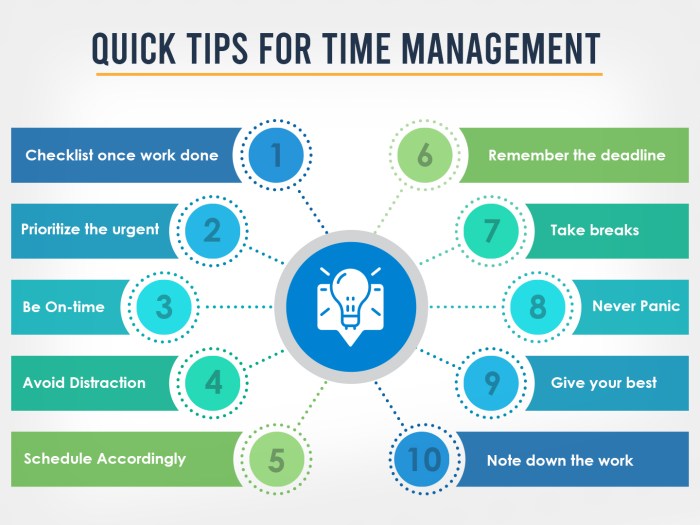Effective Time Management sets the stage for this enthralling narrative, offering readers a glimpse into a story that is rich in detail with american high school hip style and brimming with originality from the outset.
Are you ready to dive into the world of time management like a pro? Let’s explore the ins and outs of effective time management together.
Introduction to Effective Time Management
Effective time management is the practice of planning and organizing how to divide your time between specific activities. It involves setting goals, prioritizing tasks, and using techniques to maximize efficiency.
It is crucial in both personal and professional life because it helps individuals accomplish more in less time, reduces stress, and allows for better work-life balance.
Increased Productivity
- By prioritizing tasks and setting clear goals, individuals can focus on what needs to be done first, leading to increased productivity.
- Eliminating time-wasting activities and distractions allows for more time to be spent on important tasks.
- Breaking down large projects into smaller, manageable tasks makes them less overwhelming and more achievable.
Reduced Stress
- Effective time management helps individuals stay organized and on top of deadlines, reducing the likelihood of last-minute rushing and stress.
- Having a clear plan in place can alleviate anxiety about forgetting tasks or missing deadlines.
- Being able to see progress and accomplishments can boost morale and reduce stress levels.
Strategies for Effective Time Management
Effective time management is crucial for success in any endeavor. By utilizing proven strategies, individuals can maximize productivity and achieve their goals efficiently. Two popular techniques that can aid in effective time management include the Pomodoro Technique and setting SMART goals.
The Pomodoro Technique
The Pomodoro Technique is a time management method developed by Francesco Cirillo in the late 1980s. It involves breaking work into intervals, traditionally 25 minutes in length, separated by short breaks. This technique aims to improve focus and productivity by allowing individuals to work in short, concentrated bursts. By focusing solely on the task at hand during each interval, distractions are minimized, leading to increased efficiency.
Setting SMART Goals, Effective Time Management
Setting SMART goals is another essential strategy for effective time management. SMART goals are Specific, Measurable, Achievable, Relevant, and Time-bound. By defining clear and specific objectives, individuals can better prioritize tasks and track their progress. This approach helps in avoiding procrastination and ensures that time is allocated effectively to tasks that align with overarching goals.
Prioritizing Tasks
Prioritizing tasks based on urgency and importance is key to effective time management. By categorizing tasks into quadrants based on these criteria, individuals can focus on high-priority tasks that contribute significantly to their goals. It is essential to differentiate between urgent tasks that require immediate attention and important tasks that align with long-term objectives. By allocating time and resources efficiently, individuals can make significant progress towards their goals.
Tools and Technologies for Time Management: Effective Time Management

In today’s fast-paced world, utilizing tools and technologies can significantly improve time management skills. From apps to software, there are various options available to help individuals stay organized and focused on their tasks.
Apps and Software for Time Tracking and Task Management
- Apps like Toggl, RescueTime, and Clockify allow users to track their time spent on different activities, helping them identify time-wasting behaviors and optimize their schedules.
- Task management software such as Todoist, Trello, and Asana enable users to create to-do lists, set deadlines, and collaborate with team members efficiently.
- Utilizing these apps and software can streamline workflow, increase productivity, and ensure that tasks are completed in a timely manner.
Digital Calendar or Planner for Organizing Schedules
- Using a digital calendar like Google Calendar or Microsoft Outlook can help individuals keep track of appointments, deadlines, and important events.
- By setting reminders and color-coding events, users can prioritize tasks and allocate time effectively, reducing the risk of missing deadlines or forgetting important commitments.
- Digital planners offer the flexibility to access schedules from any device, making it easier to manage time both at work and in personal life.
Project Management Tools for Enhanced Time Management
- Project management tools such as Monday.com, Jira, and Basecamp provide features for task delegation, progress tracking, and deadline management.
- By breaking down projects into smaller tasks, setting milestones, and assigning responsibilities, individuals can better allocate time and resources to meet project deadlines efficiently.
- Collaboration features in project management tools facilitate communication among team members, ensuring everyone is on the same page and working towards common goals.
Time Management Techniques in Different Settings

When it comes to managing time, different settings call for different strategies. Let’s dive into how time management techniques vary in various environments.
Remote Work vs. Office-Based Work
In remote work settings, it’s crucial to set boundaries between work and personal life since the lines can easily blur. Utilizing tools like time tracking apps and creating a dedicated workspace can help maintain focus and productivity. On the other hand, office-based work may require more structured schedules and effective communication with colleagues to maximize efficiency.
Effective Time Management for Students
For students juggling academics and extracurricular activities, prioritizing tasks and creating a study schedule are key. Implementing the Pomodoro technique, where work is divided into intervals with short breaks, can enhance concentration and productivity. Additionally, utilizing digital calendars and to-do lists can help students stay organized and on track.
Time Management Strategies for Entrepreneurs
Entrepreneurs and small business owners often wear multiple hats, making time management crucial for success. Setting clear goals, delegating tasks, and utilizing time blocking techniques can optimize productivity and ensure that important projects are completed on time. Implementing project management tools and prioritizing tasks based on urgency and importance can also help entrepreneurs effectively manage their time and resources.